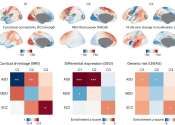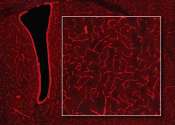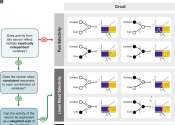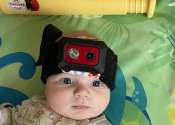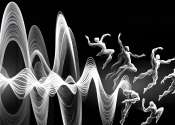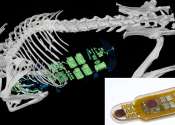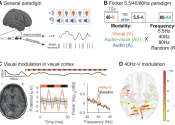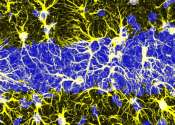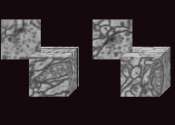Last update:
Neuroscience news
Neuroscience
After 180 years, new clues are revealing just how general anesthesia works in the brain
Over 350 million surgeries are performed globally each year. For most of us, it's likely at some point in our lives we'll have to undergo a procedure that needs general anesthesia.
1 hour ago
0
1
Neuroscience
Creativity and humor shown to promote well-being in older adults via similar mechanisms
Many people associate aging with a decline in cognitive function, health issues, and reduced activity. Uncovering mental processes that can boost the well-being of the older adults could be highly beneficial, as it could ...
5 hours ago
0
26
Climate change is linked to worsening brain diseases
Climate change is making the symptoms of certain brain conditions worse, our new review published in The Lancet Neurology has found. Conditions that can worsen as temperature and humidity rise include stroke, migraines, meningitis, ...
3 hours ago
0
0

The neural signature of subjective disgust could apply to both sensory and socio-moral experiences
Disgust is one of the six basic human emotions, along with happiness, sadness, fear, anger, and surprise. Disgust typically arises when a person perceives a sensory stimulus or situation as revolting, off-putting, or unpleasant ...
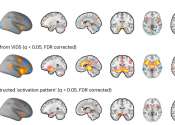
Researcher discovers drug that may delay onset of Alzheimer's, Parkinson's disease and treat hydrocephalus
A researcher in the Keck School of Medicine of USC's department of surgery has discovered a potential breakthrough in delaying the onset of Alzheimer's and Parkinson's disease and treating hydrocephalus. Young-Kwon Hong, ...
May 17, 2024
0
64

Study reveals that the brain modulates visual signals according to internal states
What we see is not simply just a neural representation of the pattern of light in the eye, but an interpretation of this image, to which our needs and expectations contribute. These factors are shaped by earlier experiences ...
May 17, 2024
0
39

Key protein behind brain asymmetry uncovered by scientists
Genetic mechanisms behind the brain's unique left–right differences are now better understood with new research, paving the way for better understanding of human disorders where brain asymmetry is disrupted.
May 17, 2024
0
14

New technique to freeze brain tissue without harm
A team of medical researchers at the National Children's Medical Center, Children's Hospital, Fudan University, in China, has developed a technique to freeze and thaw brain tissue without causing damage.

Study suggests that air pollution promotes inflammation in the brain, accelerating consequences for dementia
Results from a new study suggest that long-term exposure to air pollution leads to increased risk in dementia in Denmark.
May 17, 2024
0
0

Macaque Brainnetome Atlas: A multifaced brain map of rhesus monkey
As an ideal model for studying human cognitive function and brain diseases, macaques are highly similar to humans in genetics, physiology, and brain structure. Currently, non-human primates are considered as a core source ...
May 17, 2024
0
0

Discovery of a master neuron that controls movement in worms has implications for human disease
Researchers at Sinai Health and the University of Toronto have uncovered a mechanism in the nervous system of the tiny roundworm C. elegans that could have significant implications for treating human diseases and advancing ...
May 16, 2024
0
40
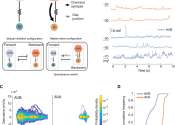
Study suggests high-frequency electrical 'noise' results in congenital night blindness
In what they believe is a solution to a 30-year biological mystery, neuroscientists at Johns Hopkins Medicine say they have used genetically engineered mice to address how one mutation in the gene for the light-sensing protein ...
May 16, 2024
0
14

Under stress, study finds an observer is more likely to help the victim than to punish the perpetrator
Being stressed while witnessing injustice may push your brain towards altruism, according to a study published on May 14 in the journal PLOS Biology by Huagen Wang from Beijing Normal University, China, and colleagues.
May 16, 2024
0
68

New gene delivery vehicle shows promise for human brain gene therapy
In an important step toward more effective gene therapies for brain diseases, researchers from the Broad Institute of MIT and Harvard have engineered a gene-delivery vehicle that uses a human protein to efficiently cross ...
May 16, 2024
0
1
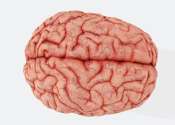
Researchers develop theory on traveling waves of activity in the human brain
For the first time, researchers led by Professor Dr. Petra Ritter's team have succeeded in explaining the propagation of traveling waves of activity in the human brain using a computer simulation. Previous studies indicate ...
May 16, 2024
0
12

Neuroplasticity study shows how singing rehabilitates speech production in post-stroke aphasia
Cerebrovascular accidents, or strokes, are the most common cause of aphasia, a speech disorder of cerebral origin. People with aphasia have a reduced ability to understand or produce speech or written language. An estimated ...
May 16, 2024
0
63

Fruit fly study reveals brain-cell circuitry that could underlie how creatures large and small see wavelengths of light
Perceiving something—anything—in your surroundings is to become aware of what your senses are detecting. Now, Columbia University neuroscientists have identified, for the first time, brain-cell circuitry in fruit flies ...
May 16, 2024
0
40

Examining the mechanisms and clinical potential of a promising non-opioid pain therapy candidate
A recent publication in Scientific Reports unveils a promising non-opioid pain treatment developed by a team led by Dr. Hernan Bazan, the John Ochsner Endowed Professor of Cardiovascular Innovation at Ochsner Health.
May 16, 2024
0
9

Study finds brain wiring predicted adolescents' emotional health during COVID-19 pandemic
The COVID-19 pandemic was challenging for many adolescents, disrupting their schooling and social/emotional development. Drawing on national data, a large study finds that how adolescents' brains were wired before the pandemic ...
May 16, 2024
0
0

Study indicates the rapid identification of stroke type is key to improving outcomes
Early identification of stroke type could be key to harnessing the benefits of very early in-ambulance blood pressure lowering treatment in patients with suspected acute stroke, according to new research.
May 16, 2024
0
0





























